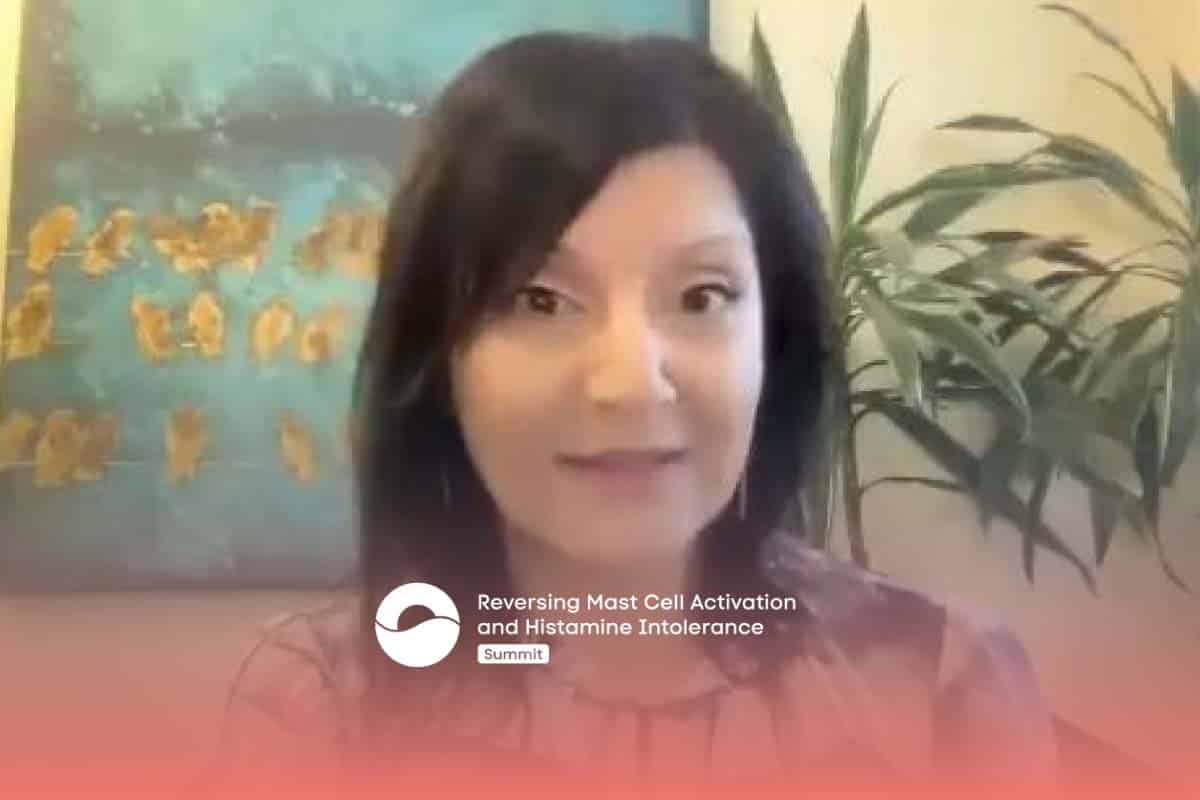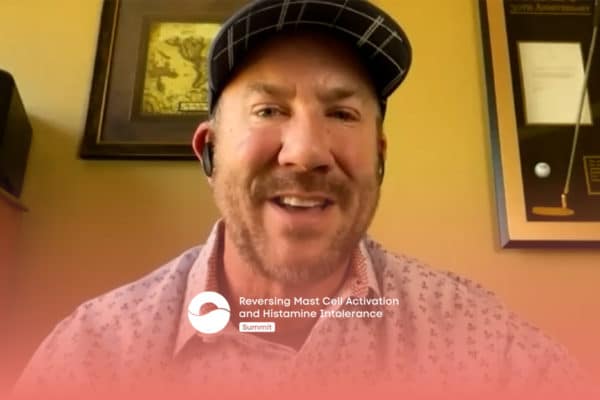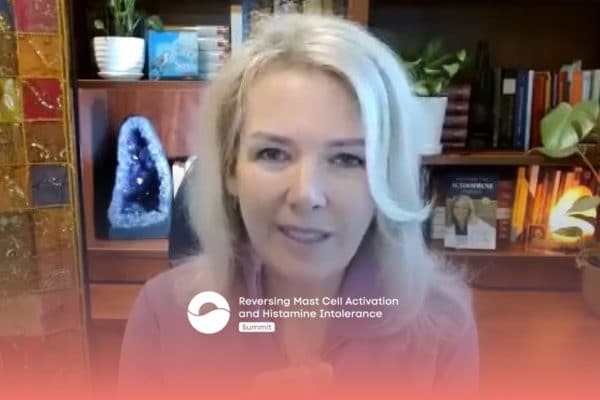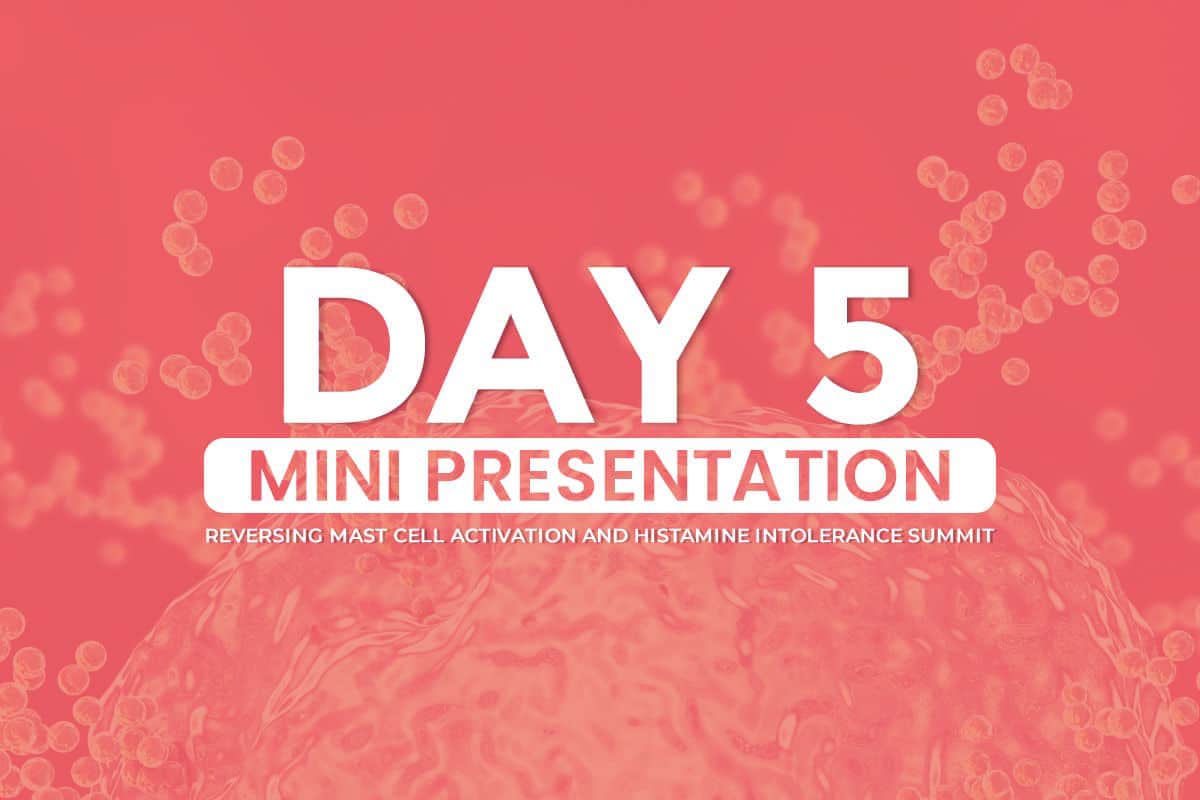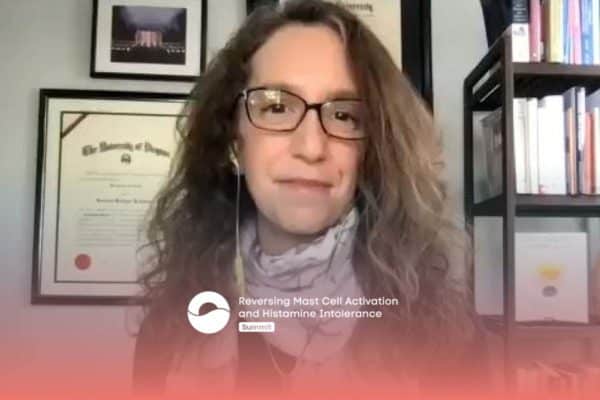Join the discussion below
- Top peptides for MCAS and complex illness
- Tips and tricks on introducing peptides for sensitive people
- When to use which peptides for best results
Beth O’Hara, FN
Welcome to this episode of the Reversing Mast Cell Activation and Histamine Intolerance summit. I’m your host, Beth O’Hara of Mast Cell 360. I’m so excited today to have my friend and colleague, Dr. Nafysa Parpia with us. We are gonna have a conversation about peptides and how to use them in types of conditions like mast cell activation syndrome, tips, and tricks. This is gonna be a really fun conversation, and bring a lot of new information to the table that there’s not a lot out there yet. So, this is a really new field, so I think you’re gonna love this interview. I wanna tell you just a little bit about Dr. Parpia. So, she has spent the last decade treating patients with complex chronic illness from all over the United States and the world, and she specializes in tickborne illnesses, environmentally acquired illnesses, mold and mycotoxin illness, autoimmunity, fibromyalgia, chronic fatigue syndrome. She uses both cutting edge laboratory tests and deep intuition, applied to the full range of scientific data to create comprehensive treatment plans that are highly personalized. Thank you so much for joining us. I’m just delighted to have you here.
Nafysa Parpia, ND
Thank you so much for having me, Beth, I’m so happy to be here. I always love chatting with you, we have so much fun in our talks about medicine and life. It’s just great to be here, thank you.
Beth O’Hara, FN
I love talking with you, too. And I would love if you could share with people a little bit about your own story and background, and how did you get into this world of working the way you do? Cause not a lot of practitioners work the way that you do, and I think that’ll be helpful for people to know context that you’re coming from.
Nafysa Parpia, ND
Absolutely. So, a long time ago, probably 15, 20 years ago, I was working in fundraising. And it sustained me financially, but it was not moving my spirit and I knew that I was called to something deeper. And so I wanted to work in healing, in the healing arts. And so I explored that, first with yoga teacher training, and the more yoga I did the more I realized, this is beautiful and there’s more. And then I heard about Bastyr, so I applied and I went there and they gave me great tools to be a good primary care physician, but still I wasn’t moved. I was because, because we could work with herbs and really work with the patient one on one, but I wasn’t moved enough, there was deeper to go. And so I started to seek out mentors who were doctors, but also healers. And one of them was Dr. Klinghardt. And I spent lots of time in many doctor’s offices, but I spent a year shadowing Dr. Klinghardt and Dr. Katie Delgrin at his clinic.
And I started working there in the IV room, and I just knew that these are the patients that I’d be working with, patients who have a lot of complex issues in their physical health, in their emotional health, and how that ties in. And I remember sitting on an exam table one day waiting for Dr. Klinghardt to come in, and I was covered in goosebumps just knowing this is it. These are the people I’m gonna be working with. It’s just my higher calling to work with patients who go through this, that we’ll talk more about. And so every day, I know I’m walking my path. Just like you, you know? You know you’re doing exactly what you’re meant to be doing on the planet. It’s like that, so I feel very, very blessed to be doing this work.
Beth O’Hara, FN
That’s I think what I love, our conversations, because you have that passion and that compassion for people who are struggling with these kinds of complex illnesses, and it’s really rare in the medical world. And I just wanna say, for people who aren’t familiar with Bastyr, that that’s one of the few naturopathic medical schools in the US. So, you’re a naturopathic medical physician, and you’re at Gordon medical.
Nafysa Parpia, ND
Yes, I’m now at Gordon medical. So throughout the past decade, I’ve been working with doctors who were very well known as healers and doctors in the complex chronic illness world. So I was with Dr. Klinghardt for a year, and then I went and Dr. Isaac Golias hired me to head up his line in chronic illness department at his clinic. So I was there for a couple years, and he mentored me in detoxification therapies. And I saw what he did for his patients with cancer in detoxification therapies, it really helped with my patients who have complex chronic illness, because the detoxification was modulating the immune system, which is what both groups of patients need. And so, I’ve been at Gordon medical for the past, I think six years now.
Beth O’Hara, FN
And we’re gonna talk about peptides, which also modulate immune system.
Nafysa Parpia, ND
Yes.
Beth O’Hara, FN
This is a really exciting, cutting edge area. And I wanted to start with the very basics for people who aren’t familiar with peptides. And can we just talk about first, what are peptides? How do they work in the body? What are they doing?
Nafysa Parpia, ND
Yes. So, they’re small proteins of about two to four amino acids. 70 to a hundred amino acids are polypeptide, and over a hundred amino acids make up a protein. So, they’re the building blocks of proteins. Now, we have more than 9,000 known peptides in the human body, and they regulate a variety of biological functions and processes. They act as signaling molecules within the body, and they instruct other cells and molecules on what functions to perform. So, they’re very, very specific in their messaging, unlike other herbs I might give, or even pharmaceuticals I might give, those are more broad spectrum. So now with the advent of peptides, we can go very, very specific with respect to talking to the cells, and cell to cell communication. We use different peptides for many different reasons, immune modulation, which we’ll talk more about, decreasing inflammation, cognition, pain relief, sleep, soft tissue repair, even weight loss, lean muscle gain, enhancement with sexual function, improving hormone imbalance. And so they’re really, really wonderful, these peptides.
Beth O’Hara, FN
So, this is how things are happening and being signaled in the body. And for people who are really, really beginner levels, they may hear protein and think, oh, protein is something I eat, and we get amino acids from proteins, but then they get made into these types of peptide proteins that are gonna do all this type of signaling, repair, immune modulation.
Nafysa Parpia, ND
Right.
Beth O’Hara, FN
Peptides come in some different types of forms, can you just explain, from a high level first, what types of forms of peptides might people come across out there?
Nafysa Parpia, ND
Yeah. So when you say form, do you mean how they’re taken?
Beth O’Hara, FN
Correct, yeah.
Nafysa Parpia, ND
Okay. So, we can have them in capsule form, we can have them in injectable form, we can have them in cream form, and then there’s an unconventional use of them, which is via IV. Not too many people do that, but that can be done as well. So, when we take it orally, it does affect the entire system, and particularly with the gut. So there are some peptides that I like to have my patients take orally for gut health, in particular, BPC 157 cause it brings down inflammation in the gut. We can use KPV as a way to manage mast cell activation syndrome, actually starting in the gut. Now, when a patient is in a lot of pain, then I like to use BBC 157 locally in that area. It’s gonna bring down inflammation in that area, in fact, it can give instant pain relief in a joint if you just inject close to the joint. Just peri-articulary, you don’t even have to go into the joint, just close, or subcutaneously over a muscle body, it’ll help relieve pain. I’ve had patients, after I’ve injected them, have tears in their eyes and say, what? I thought I had to live with that level of pain, but I don’t. And it lasts! It lasts for several months.
Beth O’Hara, FN
That’s wonderful. So, we could use that for like a frozen shoulder or tendonitis.
Nafysa Parpia, ND
Yes.
Beth O’Hara, FN
Those types of things, ligament inflammation.
Nafysa Parpia, ND
Absolutely. So, you know, that’s what’s done in regener medicine now, instead of a steroid shot, we can do this. Or instead of PRP even, or in addition to PRP or PRF, it makes it more potent.
Beth O’Hara, FN
Oh, that’s wonderful. That’s so exciting to hear about.
Nafysa Parpia, ND
Yeah, yeah. And then local injections. So, sometimes we want a more potent effect with the patient. If somebody’s ready for that, then we’ll order it from the compounding pharmacy and they’ll inject some, just in a little bit of abdominal tissue. Self injection, very easy, very quick, and it’s gonna be more potent that way.
Beth O’Hara, FN
It’s something people could do at home, they could get it prescribed and they do it at home.
Nafysa Parpia, ND
Yeah. We have them show up at the office and have our nurse show them how to do it themselves the first time, and then they can go home and do it themselves.
Beth O’Hara, FN
So, I know we wanna really look at, there’s so many peptides and we could spend a whole week, 40 hours just talking about peptides and their trainings, you know, in depth. So, I know we’re gonna hone in on just a segment of peptides that are used in immune response, since we’re focusing on mast cell activation. How do peptides work to modulate immune response?
Nafysa Parpia, ND
So, we have different types of peptides that do that. There’s Ta1, which unfortunately we can’t get in the USA anymore. That’s very recent, I’m hoping that comes back. And there’s TB4-FRAG, those are the two main ones that help to modulate the immune response, same with KPV. So the Ta1 is gonna stimulate the immune system. Now, I found with my patients, if I go in and I use that one first, a lot of my patients have autoimmunity, use that first and it could kick up that storm. And so I like to come in with TB4-FRAG, because it’s gonna modulate that first, it’s gonna calm the system down. So I start with TB4-FRAG to calm down the immune system. Amlexanox also helps with modulating mast cell activation syndrome, it actually blocks histamines. And then KPV, so those are the main ones that are gonna modulate the immune system.
Beth O’Hara, FN
So that middle one, can you spell that for people who may not be familiar with these peptides?
Nafysa Parpia, ND
Amlexanox. So, A, M like mom, L E X A N O X.
Beth O’Hara, FN
Okay, so we’ve got the, I’m having trouble pronouncing that one, say it for me.
Nafysa Parpia, ND
Amlexanox.
Beth O’Hara, FN
Amlexanox. So we have this one, we’re talking about TB4-FRAG, we’re talking about BCP 157. So, these are our big immune regulators. And then the KPV, how does the KPV work?
Nafysa Parpia, ND
The KPV also acts to help, it’s an anti-inflammatory and it also helps to stabilize mast cells. So, my favorite trio to begin with is BPC 157, TB4-FRAG, and then if the patient has mast cell activation syndrome, and most of my patients do, I’m also gonna layer in amlexanox next and KPV next. Then after they’ve been on those for a couple months, I might add in Ta1, if it becomes available, or LL37 is also another nice one that helps kill infections. But I’m not gonna kill infections until I start to bring inflammation down. A lot of the times, most of my patients, they have a lot of infections. They’ve got tick born disease, just like yours, mold, viruses, parasites, a plethora of bacteria, all of these infections, all at once. And then they have lots of environmental toxins as well, they have metals, myco toxins, a lot of glyphosate, very often pesticides. And I learned this the hard way before I had the use of peptides for some people, before we learned about mast cell activation syndrome, really, right? I would start to detox like nine, 10 years ago, I would start to detox people first. And it was a long haul, it’s a struggle, but we did it, but a lot of people, they can’t handle detox or they can’t handle killing infections first. So we need to modulate the immune system first. So now at the advent of peptides, I can make that happen really, really quickly. And so I’m doing immune modulation first, along with mast cell treatment, with our herbs to treat mast cell, and medications if needed. And then I’m gonna come in to start to detox and kill infections.
Beth O’Hara, FN
And that’s one of the things that I think we always have fun geeking out on is, we have a similar philosophy that, I call it the stabilization phase. We have to stabilize before we can start to detox. And even within these peptides, there’s this order of operations in terms of when you would bring which ones on at which stage. So, just to recap for people, cause I know a lot of our audience are brain fogged that we need to stabilize and calm the inflammation down, calm the immune system down before we get into detox protocols, and before we start killing infections. So there’s that just that same philosophy, that same approach in terms of the peptides that you’re gonna bring on board. So, I wanted to ask, what about for people who are extremely sensitive? So, we both have a lot of people who are really sensitive. I get people in who are down to less than 10 foods, they’re reacting every time they try supplements, we have to back up and really check their environment for mold and other chemical triggers. We check for emotional triggers and toxic people, we really work on that nervous system rebooting. And I know we’ve got a lot of people in that situation who are gonna listen to this as well. What would you say to them? What kind of advice would you give them around those peptides?
Nafysa Parpia, ND
Yeah. So the first thing is, it’s very important that they’re working on rebooting the neurological system and they’re working on all that foundational stuff that you just mentioned. And the peptides can be an excellent foundation for these people as well. So one thing I’ve seen is that, in complex chronic illness, a patient that might have taken five years to treat, it’s a long haul, we get them 60 to 70% better, it takes a long time, those people I can now get better in eight to 12 months. They come to the clinic, they do all kinds of treatments, and I’m also using peptides. Now, like you said, a lot of these people, they can’t tolerate very much, some of them are even sensitive to water. And so what do I do? I give them a little bit of injectable peptide. I notice that a little bit of injectable peptides a lot of these patients can handle. And they’re scared, of course they’re scared because almost everything they take, it sends them backwards. And so I tell them, alright, let’s just try a little bit. They try a little bit and oh, okay, I didn’t feel anything. And I say, that’s a good thing. At least you didn’t feel anything. It’s gonna take a little bit of time for you to feel better, but it didn’t make you backfire. So, we slowly increase the dosages.
So, that’s what I do with the injectables. And then there are other peptides that I really love that we can take in oral form. I have people open up the capsule, dip a toothpick in, and just put a toothpick amount in. And if one dip is good, then three days later make it two dips into the toothpick, and so on until they can reach a half cap and then eventually a one cap. And usually they’re fine. I’ve never seen peptides backfire on anybody, except for when the wrong peptide is given at the wrong time. For instance, if somebody takes BBC 157, I’m gonna say, if they take a high dosage of BBC 157, because they have a lot of inflammation in their gut, but they have mast cell activation syndrome, it can flare it. So I’m not gonna give those patients a high dosage of BBC 157, they’re gonna get a low dosage. And then if the patient is very sensitive, they’re just gonna get a dip of a toothpick in, and we’ll go from there.
Beth O’Hara, FN
Then, I know that there are some that are available topically. And I often like using topicals for people who are super sensitive, who have massive amounts of GI mast cell involvement, they’ve got a lot of dysbiosis, they’re reacting every time they put food in their mouth or they swallow something. So we can initially bypass that where the gut is just, it doesn’t matter. These are people that have trouble with water, they’re having trouble with everything. Can you tell us about what might be available in topical form?
Nafysa Parpia, ND
Yeah, you can get almost any peptide from the compounding pharmacy in topical form. For patients who have cranial cervical instability, I like to give them a BP 157 cream, which I get from the compounding pharmacy. And also a way to bypass the gut is to give small injections to subcutaneous injections as well, which we can get from the compounding pharmacy. So, the injections are gonna be a little more powerful than the cream, but you know, a little more pleasant in the moment because the injections, they don’t hurt a lot, it’s the little sting in the moment.
Beth O’Hara, FN
So then that, we can bypass the gut either way. And I’m thinking just for these people with extreme nervous system dysregulation, where that little sting might be too much just yet, maybe they could start with the cream.
Nafysa Parpia, ND
Yes.
Beth O’Hara, FN
Then as they’re feeling safe with that, and they’re getting the nervous system rebooted, they could go to the subcutaneous.
Nafysa Parpia, ND
And even IV. It’s a little unconventional, but it can be done, and they do very, very well.
Beth O’Hara, FN
Wonderful. And then they can work up to the little toothpicks, and orally. But then other people are not gonna be so sensitive, and then they can move through more easily.
Nafysa Parpia, ND
Right. And so most of my, well, I’m gonna say 95% of my patients have complex chronic illness, the 5% that don’t are the spouses of the people, you know, or relatives or something. But so most of my patients are quite sick with complex chronic illness. And for most of them, I actually can start them on high doses. I like to start them on the high doses of BPC 157 and TB4-FRAG, and even KPV to begin with, because it’s giving them this loading dose to help bring down inflammation. And then slowly bring them down to a more moderate dose. So sometimes even three caps twice a day of those ones to begin with, depending on the patient though. So for anybody listening to this, I wanna make sure you don’t just buy them and take them, you need to talk to your doctor who knows about peptides about this. Cause it it’s easy to take the right medication at the wrong time or the wrong dosage, and then you’re not very happy.
Beth O’Hara, FN
Yeah, and I hate for people to, I se this all the time where people bring in things at the wrong time, and then they just throw the baby out with the bath water because they didn’t have a good experience, but it was that timing. So I have to remember that if we have a problem with something, it’s usually the body saying not now.
Nafysa Parpia, ND
Exactly.
Beth O’Hara, FN
So, I think this is really helpful for people. And then, anything to watch for? So you were sharing with me, because I’m working with the BPC 157 and I had noticed I fell a little over stimulated today. So, can we talk about some of these things people might notice? And, and then that was a good clue for me, okay, maybe an eighth of a capsule is a little too much for me to start. I’m not super sensitive anymore, but I’m still sensitive.
Nafysa Parpia, ND
Yeah. So, BBC 157 can wire some people, it can give some people extra energy. And sometimes we want that. Some people, if they take BPC 157 after 2:00 PM, they’re gonna have a hard time sleeping. But BPC 157 is my favorite peptide of all time! It’s a big anti-inflammatory for the whole system, starting with the gut or injected locally, you know? So, it also modulates snips, Apo A, Apo B, Apo E, it’s gonna modulate those, so that’s wonderful. So, I love this peptide for so many reasons. It also helps to repair tissues. So when I say, oh, don’t take it after 2:00 PM, it might scare some people and say, oh, maybe I shouldn’t take it at all. No, not at all, just if you’re sensitive, just take it early on in the day. I expect you to see results quickly with BBC 157.
Beth O’Hara, FN
So, this is like really exciting, I had not heard this about modulating Apo E, and I have Apo E variance, and I’ve had a lot of concussions. It’s always very much in the forefront of my awareness to keep working on reducing the Alzheimer’s risks, the dementia risks for myself. And I work hard on that, so I’m very excited about that. Are there any other snips that this one modulates, or that the KPV, or the other ones we’ve talked about modulate?
Nafysa Parpia, ND
Those are the three that we know of for BPC 157. I know GHK is also a genetic modifier, and also the GHK CU with the copper in it, because we need the copper to open certain parts, certain pathways of the enzymatic functions, also for the DNA. So, the GHKCU helps with that, it’s also great antiinflammatory. And so, speaking of Alzheimer’s risk, there are a lot of neuro peptides that I like to use as well, and they work wonders for people who have brain fog. But, you know, I’m not gonna use those until after I finished killing infections. Same with same with repairing mitochondria, we’ll do that after. So, you know, with these patients, they have a lot of neurotoxins because they have tickborne disease and molds and other bacteria that create these neurotoxins. So, you know, again, starting with the BPC and the KPV, and then we can bring in some cerebro protective peptides. These are the neuro peptides, VIP is one of them. And I’m sure you use VIP, or have used VIP when dealing with your patients with mold. But we know that we wanna use it after we finish treating the infection. So, C-link is one that helps with elevated BDNF, and it helps with detoxing as well. It’s cerebro protective, and it helps with those toxins that are latched to receptor sites in the brain. Cerebrolysin helps the detox, neurologically. It grabs up the neurotoxins and pulls them out. Glutathione, people don’t realize, but it’s a peptide. It’s a tripeptide.
So, I like to use a cerebrolysin with glutathione, because it’s grabbing up the neurotoxins and pulling them out. So I’m using these peptides with all different modalities. The beautiful thing about the peptides is that you can use them with anything, herbs, pharmaceuticals, IVs, anything, and it makes all these treatments go so much faster, which is why I just love working with the peptides. There’s also C-link. C-link, C-max, and cerebrolysin, all three of them are gonna help with the neurological system. So there’s a lot of research out there now with patients with Parkinson’s, recent literature shows that a lot of it has to do with environmental toxins, and those toxins are affecting their neurological system. So I’m testing these patients for their infections, for their toxins. And also looking, speaking of neuropeptides, looking at the Cunningham panel or the neural Zoomer to look at if there’s autoimmunity in the neurological system, and if that’s related to different infections. So it’s really a dance in weaving the peptides in and out of all the other therapies that I’m doing for the patients.
Beth O’Hara, FN
And this is so helpful for people to know, that you really need somebody who understands these peptides and understands when to bring them in. So just like glutathione in our sensitive population backfires so often, cause it’s brought into soon.
Nafysa Parpia, ND
Exactly.
Beth O’Hara, FN
We have to understand that actions that these different types of molecules are having, and things that are helpful in Parkinson’s, for somebody who’s overstimulated and has too much dopamine, is not the right thing for that person.
Nafysa Parpia, ND
That’s right.
Beth O’Hara, FN
Gotta look at those things. Cause things that help Parkinson’s are usually increasing that dopamine. My dopamine’s always super high, so anything over there in that Parkinson’s area that’s gonna raise dopamine is gonna send me off the cliff.
Nafysa Parpia, ND
Right, right. And so that’s why, with patients who have infections and toxins causing mast cell activation syndrome, we need to calm the mast cell activation first. We need to calm the inflammatory cytokines first, then we come back to order, right? Order of operations. Then we detox, then we kill infections. And all of this is then eventually going on all at once, weaving the peptides in and out for the right person, the right dosage, at the right time, just like everything else we’re using.
Beth O’Hara, FN
That’s wonderful. So, any other things to watch for in terms of, well, I actually wanted to step back to the BPC 157. Cause I had another question there in terms of it being stimulating. So I started with an eighth of a capsule, it was a little overstimulating. And I’m super sensitive to caffeine, so I can have chocolate now, but I can have one square of dark chocolate and then that’s plenty, I can’t do any kind of caffeinated things. So, if somebody’s starting to get that overstimulation, like I experienced, would you recommend just continuing to drop the dosage down? Or how would you work with that?
Nafysa Parpia, ND
Yeah. So, if somebody has some, and now this is for anything, this is even, for example, a Byron white herb, like AL for lime, right? So, if somebody has too much of say BP 157 or anything else, but we’ll bring it back to BPC 157 specifically, and they get over stimulated. What I say is, okay, don’t take any more until you go back to your baseline. So, when somebody who’s very, very sensitive, it could take a couple days, it could take a week, might take even longer in some very unfortunate circumstances, but that’s rare. Usually it’s a few days before somebody normalizes if they’re highly sensitive. If you’re not highly sensitive, you’re moderately sensitive, just take a few hours before you normalize. So I just say, okay, watch, really watch when you normalize and tell me how long it took, and then start at half the dose that was too much for you. And usually that’s a good place to start.
Beth O’Hara, FN
So, I can start back with the 16th. And then, for some of my extremely sensitive people, I’ll have them put something new to sprinkles in water and they stir it and they’ll just take a sip of that. So, we can get into almost a homeopathic type.
Nafysa Parpia, ND
Right, really diluted. Some people, less is more, you know? And I know, a long time ago when I first started practicing, that was hard for me to understand until I saw it happen. I remember thinking a long time ago, well, if you’re taking just a few sprinkles, how is your system gonna feel that? But people’s systems do.
Beth O’Hara, FN
Yeah, definitely. And I have some people who, in these tiny micro doses, they do so much better than they do at a half of a capsule or a whole capsule. So it’s about finding what’s right for that person.
Nafysa Parpia, ND
Right, as with anything. And I think this is really important to address here, that when we kill off an infection or when we detoxify, or even give a peptide, really what I’m saying is, when you give any substance to our patients, if something makes them worse and the patient says, doesn’t that mean the treatment is working? It’s making me worse, doesn’t that mean we’re killing the infection? I wanna keep going, I’m just having a reaction, I’ll get through it. And I say, no. No, we’re not gonna push you that hard. When you feel worse like that, it even means that we’re upsetting the mitochondria, you know? And when that happens, we’re creating more long term chronic issues. So with my patients, I tell them, you know, let’s just dial this back down.
We’re not gonna push you so hard to the point you don’t feel good. Sure, sometimes your system might be shaken for a few hours or a day, that’s okay, but prolonged like that, no. But I have noticed, when I give people the right peptides to begin with, they have less Hertz reactions. In the old days, we call them Hertz reactions, in our clinic, we think of that as a mast cell flare, actually. But these peptides have prevented our patients from having a hard time with detox, or killing, so therefore they can heal quicker and get back to their lives quicker.
Beth O’Hara, FN
And that’s so exciting. And just really want to underscore what you said, that if we’re pushing into flaring, or what people call Hertz reactions with detox and killing protocols, that we’re actually damaging the mitochondria more, we’re causing more damage, we’re swimming in this toxic soup, and we’re increasing more mast cell activation. And I worry that we can easily get into, have seen this many times, what I call a mast cell cascade, where these mast cells are starting to get flared from the toxins, and then they release these mediators, they flare the surrounding mast cells, they’re releasing mediators, and it just goes out exponentially like a forest fire. And that can last for months, so we really have to be careful not to move into that.
Nafysa Parpia, ND
Exactly, yeah.
Beth O’Hara, FN
What else do you have for us that you wanna share on the peptides?
Nafysa Parpia, ND
Yeah, one thing I didn’t mention about the GHKCU is that, you know, it is a genetic modifier, but it also helps to work with anything that the hypothalamus is doing, and that means hormones. And so that’s pretty amazing, because a lot of our patients, due to having a combination of a lot of infections and a lot of toxins, not only do they have mast activation syndrome, but they have problems in their hormonal systems. I see men, young men, I’m talking about men in their early to late twenties into their thirties and forties looking like they have hormones of a 70 or 80 year old man. They don’t have enough testosterone, they have too much estrogen. And I see women who don’t have enough estrogen and progesterone, but they have too much testosterone. So, the GHK is gonna help with that. So I give people that and maybe, you know, I need to give people bioidentical hormone therapy in addition, or hormone therapy for their thyroid in addition, the GHK really helps in conjunction with that.
Beth O’Hara, FN
And when would you bring that in, in this kind of in this context of what we’re talking about with these complex, chronic conditions?
Nafysa Parpia, ND
Yeah. So, I’m gonna weave that in, probably after I know they stabilized on the BPC 157, the TB4-FRAG, and the KPV. Once they’re stabilized there, then they’re gonna notice the difference. Most of them do they say, whoa, what happened? I feel less fatigued, I feel less inflamed. I’ve had some people try to come off of them too early, and they say, oh, I noticed that I went back to old symptoms. So I say, you know, just stay, stay on them until we’ve treated the causes, right? And so then, once I know they’re stabilized on those for about a month, then I’ll bring in the GHK.
Beth O’Hara, FN
And is that also gonna work for the thyroid? So many people have thyroid dysfunction, usually hypothyroid in this population.
Nafysa Parpia, ND
Yeah, it’s gonna help with that as well. And then a lot of my patients might have glucose, high blood glucose, even though their diets are pristine. They might even be slender people, but it’s the environment, the toxins and the bugs and structural integrity issues and emotional issues, all of that flaring the hormonal system and their blood glucose is out of control. Flaring the hormonal system and causing certain genes to show, right? So for some people it might show in their blood sugar, for some people it might show in their neurological system, for some people, other systems, in the gut, right? So a lot of these patients, we can’t get their blood sugar under control for that. I like to use MOTS-c and semiglutide with BPC 157, cause it helps to modulate insulin and glucose in the pancreas. And it helps regeneratively in the pancreatic eyelet cells to help the pancreas restore and build.
Beth O’Hara, FN
This is fantastic information. How do we know when to start coming off of peptides? Is this something that people would do long term, or is this something that we start to come off of at some point?
Nafysa Parpia, ND
I have people on them for a long time. I’d say throughout the whole course of treatment, not necessarily the same ones, and not necessarily ongoing, but say I’m treating a patient for a year. I might have them on the peptides for three months, pull out a couple of them, bring in the next one that they need, and then keep going with them for a year while I’m doing everything else. While I’m treating infections and toxins and managing structural integrity and all of that.
Beth O’Hara, FN
So once the mast cell activation seems to be addressed, you might pull out the KPV, the guts healed, you might pull out the BPC 157, then you’re gonna bring in these more hormone gene regulators. And then you pull those out go to the neuropeptides. It’s more like a progression.
Nafysa Parpia, ND
It’s a progression. And then for sexual health, a lot of these patients, they’re having a hard time in that area as well. They don’t have a libido when they’re young, or they just got married or something, you know, they need to spruce that up. So the three peptides for that are PT 141, melanotan and kisspeptin. So, for young men where their testosterone is low, I don’t need to give them Clomid anymore, which is a medication, to help their latent cells stimulate their own testosterone. I can just give them kisspeptin, this is gonna help them build up their testosterone. Not too quickly, they need to be on it for several months. And then you give them a little bit of melanotan with the kisspeptin and it’s gonna help build their libido. And BT 141 is gonna help with the erectile dysfunction, a lot of young males are having that, and it’s gonna help with libido for women. These are ones you need to be careful with. So some people might say, oh, I want that, and take too much. It’s too much. So, those have to be monitored. For women who have chronic illness, a lot of times they’re having issues in their sex life and they need help there. So for them PT 141, and also a little bit of oxytocin, and then we can help them enjoy that part of their lives. I’ll add that in, you know, maybe six months into somebody’s treatment, if I’m gonna treat them for a year, maybe three months in. And so these peptides help on so many different levels, and they make treatment go so much quicker. So, I just love them.
Beth O’Hara, FN
Yeah, it brings a lot of hope, and I’m excited about all the possibilities, and aware that there’s a real depth of knowledge and training that’s needed in terms of implementing these. So, just cautioning people, don’t just go grab these off of the internet. I’ve seen a number of shady sites selling these as well, and there’s a lot of issues of quality.
Nafysa Parpia, ND
Yes, we need to talk about this with our audience. So, you can get them from the internet and they’re cheaper, but there’s no quality control. Sometimes mercury has been shown to be in those peptides, and a lot of the times, there’s a certain end process when peptides are created and that end process makes them bio available. So now, usually those are only done in the lab, they’re only done at the compounding pharmacy. So now people are getting peptides off the internet that are not bioavailable, that could possibly have mercury, sometimes they’re made in somebody’s garage, I’m not joking that there’s been an instance of that. And then we have to detox people from the peptides that are not bioavailable, or from mercury that has now entered their system. So, you know, it’s cheaper, but it’s not something I support at all. So we wanna get them at the place where we know where they’re coming from, where they know their standards in place for production and cleanliness. So, from the compound pharmacy.
Beth O’Hara, FN
And the same as supplements, we see counterfeiting. This is why I tell people, let’s not get supplements on places like Amazon, because there’s been counterfeiting and you see pharmaceutical grade brands, it looks exactly the same, but it wasn’t. It came from someplace overseas, and they found toxins. They’ve often found that what you think is your pure Encapsulations or thorn product off of Amazon, isn’t really what it says it is on the bottle, there’s something entirely different in there.
Nafysa Parpia, ND
If people can get something from the drug store, from say, Walgreens or Costco, dump it out, you know, sorry, dump out the good stuff, put the stuff from Walgreens or Costco in the nice bottle, reseal it, make it look professional and resend it. In fact, I saw an article written by a guy who worked at the FDA, and he actually saw this happening and he reported it. So I tell patients also, don’t get that from Amazon cause I can’t stand behind that. I don’t know what’s in there, you know?
Beth O’Hara, FN
Yeah. There’s a lot we can get on Amazon, but please get your supplements, get your peptides through a reputable source.
Nafysa Parpia, ND
Exactly.
Beth O’Hara, FN
Is there anyone who shouldn’t use peptides?
Nafysa Parpia, ND
So, in my experience, I haven’t seen anybody who shouldn’t, but I can say that there are certain peptides that you should not use right away if you have certain conditions. Just like with any medication or any supplement, really. So for example, if somebody has autoimmune conditions, I don’t want them using Ta1 yet, I don’t want them using too much BPC, little bit of BPC, yes. For somebody who’s very, very sensitive to pain, I don’t wanna be injecting them subcutaneously with peptides because it’s gonna flare that nervous system response in that patient. So it’s just being careful with them, as you’re careful with anything, as we’re careful with anything that we use. But they’re not toxic and they’re so gentle on the body, yet so specific with what tissues and cells they’re directing. I just love them for that reason.
Beth O’Hara, FN
Well, I know we just scratched the surface on a very deep topic, but I so appreciate you sharing your knowledge and experience with us. And there’s a lot of info out there about peptides, but not about, what do we do with people with all these complex conditions and the sensitivities. So, thank you greatly for sharing with us, and sharing your passion and your heart and your soul. I just love having you on here with us.
Nafysa Parpia, ND
Thank you so much. I just love being here with you. I love the way you practice, I love how heart centered you are and technical you are. At the same time and you give your all to your patients, I love that about you. And I just always love talking to you on a personal level, on a professional level. So, thank you for having me here, Beth.
Beth O’Hara, FN
Now, I’m wanted to tell people that there’s a free download that you’ve put together for them on peptides for complex chronic illness, and they can get more information in the download section, in the free download section. And can you tell people how to find you?
Nafysa Parpia, ND
Yes. So, I’m at Gordon medical and the website is www.Gordonmedical.com. Now, you don’t have to live in the San Francisco bay area to come and see us, people do come from all over the country for intensive therapies with us. To use peptides and all kinds of other great treatments.
Beth O’Hara, FN
That’s a great resource for people. Thank you again so much for sharing with us, really appreciate all that you do and all of your work for this difficult population that’s really struggling. And to have a provider like you who’s so compassionate and knowledgeable is a rare find.
Nafysa Parpia, ND
Thank you so much, Beth. I feel the exact same way about you. So, thank you for all that you do.

